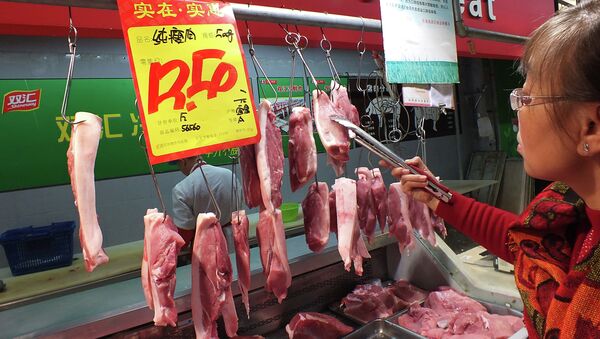MOSCOW (Sputnik)- China is unlikely to rely on pork imports from the United States to help stabilize skyrocketing prices in the domestic market, as Chinese authorities struggled to contain an outbreak of African swine flu in the country, industry experts told Sputnik.
The country’s pork production fell 5.2 percent from the previous year in the first quarter to 1,463 tonnes, while prices for hogs jumped 36 percent from a year ago to 15.15 yuan (about $2.26) per kilogram in the first week of April, according to Chinese officials at the press conference.
Officials from the Ministry of Agriculture and Rural Affairs (MARA) expect domestic pork prices to break the historic highs from 2016 by the fourth quarter of this year. A research report published by MARA this week predicted China’s pork imports to expand to 1.7 million tonnes in 2019, up almost 50 percent from 1.19 million tonnes in 2018.
As US-China trade talks are moving closer toward reaching an agreement, US industry analysts suggested that Beijing could be forced to offer concessions to Washington as US pork imports could help bring relief to the nation’s impending pork shortage, CNBC reported on Tuesday.
Preference for Fresh Pork
However, Chinese industry analysts argued that Beijing is unlikely to rely on US pork imports to solve the nation’s pork production crisis as the amount of imports only accounts for a fraction of China’s overall pork consumption.
"Even when pork prices reached record highs in 2016, we didn’t really see pork imports grow rapidly. The annual imports stayed around 1 million tonnes. Based on our estimation, China’s pork consumption in 2018 reached 54.20 million tonnes, which accounted for about 49 percent of global pork consumption. From this perspective, pork imports contributed to less than 2 percent of China’s domestic pork consumption. That’s why pork imports would have very limited impact on overall market in China," Wang Yanan, a pork industry analyst at Shandong-based consulting firm SCI99, told Sputnik.
READ MORE: Lighthizer, Mnuchin to Hold Trade Talks Next Week in Beijing — Report
The analyst explained that pork imports are unlikely to help fill in the void of reduced domestic pork production in China, because Chinese consumers prefer fresh pork while imports can only bring frozen pork.
"Only frozen pork can be imported into China. But Chinese consumers mostly love to buy fresh pork, which accounts for about 80 percent of overall pork consumption in China. That’s why imported pork is very unlikely to have a direct impact on the domestic market," she said.
Pork Production Crisis
Nevertheless, China’s pork production took a big hit from the African swine flu outbreak earlier this year, Wang admitted.
"Pork production in some hard hit provinces in North China has fallen 30-45 percent compared from the beginning of this year. When the prices started to rise, a couple of producers tried to boost production capacity. But the death rate among the baby pigs was almost 100 percent once they contract this deadly virus. That’s why the breeders couldn’t boost production even if they wanted to," she said.
As the African swine flu does not affect humans, workers on the pig farms could even bring the virus to the pigs if they got in contact with infected pork, which makes the virus much more difficult to control, the analyst added.
According to available market data, average pork price in China stood at about 20 yuan per kilogram in April and the record high in 2016 was 31 yuan per kilogram.
However, if pork becomes too expensive in China, domestic consumers could opt to eat poultry, which can be a more affordable alternative, Feng Yonghui, chief analyst at pork industry consultancy Soozhu, pointed out.
"When pork becomes more expensive, it’ll be naturally replaced by some competitive products in the market, such as poultry. If pork costs 20 yuan per kilogram and poultry costs 10 yuan per kilogram, more people will choose to eat poultry. But obviously, this only applies to those price-sensitive consumers. For those who just want to eat dumplings made of pork, they will have to accept the higher pork prices," Feng told Sputnik.
Potential for Growth
After US-China trade tensions escalated in July 2018, Beijing retaliated by slapping 25 percent additional tariffs on US goods including pork. The tariffs hike led to Chinese importers choosing pork from Germany and Spain, over US produced pork, according to Feng.
"At its peak in 2016, China imported about 400,000 tonnes of pork from the United States. But after the tariffs last year, the United States fell behind Germany and Spain to become China’s the third largest source of pork imports. If the tariffs can be removed after a trade deal is reached, pork imports from the United States would have a lot of room for growth," he said.
READ MORE: Scholar: Chinese Companies Will Switch to Europe Instead of US Amid Trade War
But Feng stressed that the US pork producers have to face another hurdle when trying to export their products to China, because Chinese authorities have banned the use of ractopamine, a feed additive.
"US pork producers continue to use feed additives such as ractopamine, which has been banned by Chinese authorities. They need to get their products certified to prove they’re ractopamine-free, before they can export the pork to China," he said.
The analyst added that the United States is well positioned to boost its pork exports to the Chinese market, thanks to its massive production capacity, which makes it the world’s second largest pork producer behind China.
*Views and opinions expressed in this article are those of the analysts and do not necessarily reflect those of Sputnik.



